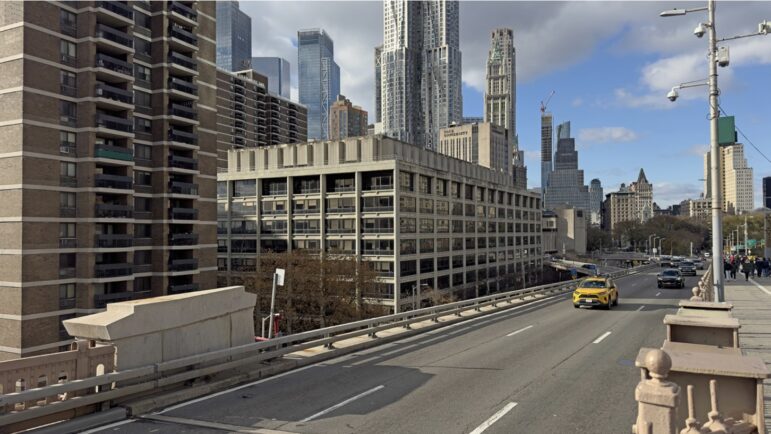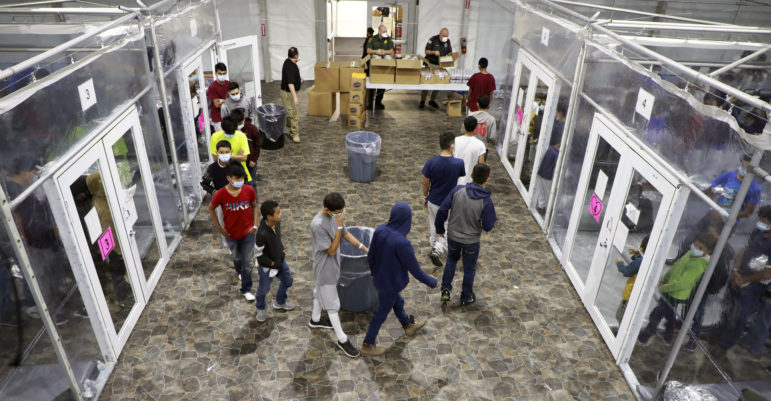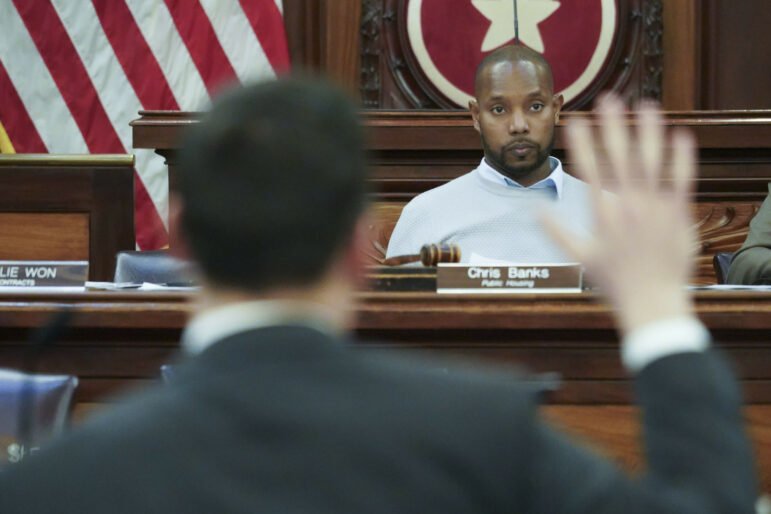Dozens of other states have embraced some version of an Equal Rights Amendment in their constitutions. New Yorkers will get a chance to vote on whether to expand the class of people protected against discrimination in the Equal Protection Clause of the state constitution.
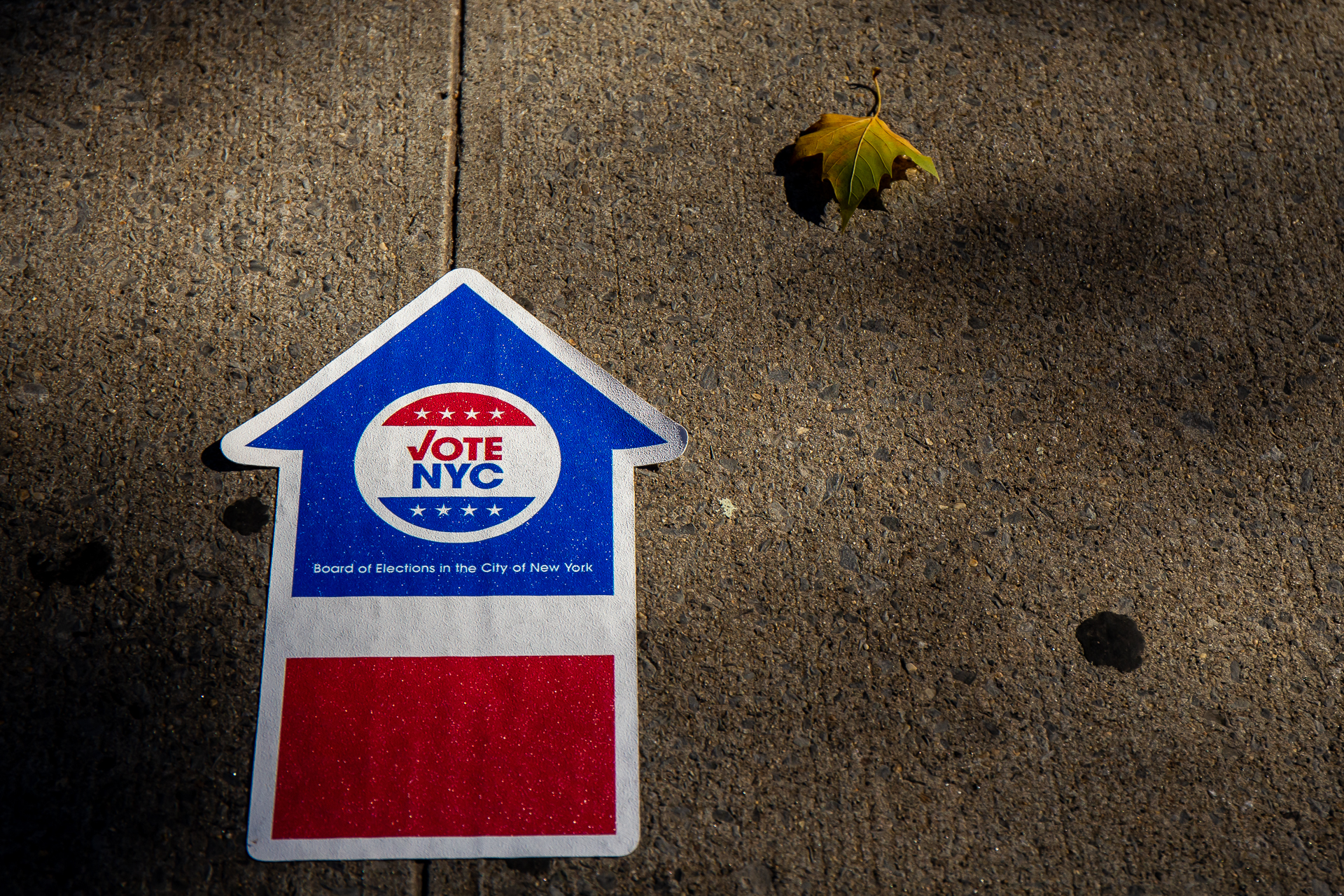
Adi Talwar
A marker directs voters to their poll site on Election Day.Editor’s note: After this story was published, New York voters approved ballot Proposal Number 1, with nearly 78 percent of ballots in favor of the measure, according to the city’s Board of Elections. This story was originally published on April 16, 2024, and was updated on Oct. 28, 2024 to reflect changes in the election landscape since last spring.
As November approaches, voters’ attention will undoubtedly be fixed on the showdown between Vice President Kamala Harris and former President Donald Trump. But when New Yorkers head to the polls, they’ll also have an opportunity to weigh in on the Equal Protection of Law Amendment.
Passed in the wake of the Supreme Court decision that overturned Roe v. Wade, the amendment, co-sponsored by Senator Liz Krueger and Assemblymember Rebecca Seawright, would expand the class of people protected against discrimination in the Equal Protection Clause of the New York Constitution.
The measure passed in both state chambers in two consecutive legislative sessions—as required for a state constitutional amendment—and now heads to New York voters for ratification.
If it passes, new language will be added stipulating that people cannot be denied rights based on their “ethnicity, national origin, age, and disability” or “sex, including sexual orientation, gender identity, gender expression, pregnancy, pregnancy outcomes, and reproductive healthcare and autonomy.”
The current iteration of the Equal Protection Clause, which was initially adopted in 1938, prohibits discrimination against people based on race, color, creed, and religion—but stops there.
In addition to New York, dozens of other states have embraced some version of an Equal Rights Amendment in their constitutions. The ERA has been under consideration at the federal level for over 100 years—it was introduced in 1923—but has never mustered the two-thirds vote from the congressional chambers necessary to add it to the U.S. Constitution.
New York would be the first state to include such all-encompassing language, something advocates hope will set the tone for other states.
One such advocate is Heather Betz. Over the course of her time working as a supervising attorney and now the director of New York Legal Assistance Group’s LGBTQ Law Unit,* Betz has witnessed what she calls “rampant” discrimination against the LGBTQ population—predominantly in the workplace, but also in people’s day to day lives. This can lead to mental health issues, she said, and prevent her clients from seeking future employment.
“Even though we have very robust human rights laws, there’s still lots of discrimination that people are suffering from,” she said.
The proposed amendment, set to appear as one of six proposals on the back of ballots for New Yorkers who are voting early this week and on Election Day Nov. 5, is seen by supporters as a way to enshrine specific protections into the state’s constitution.
They say it would provide stronger safeguards against discrimination and attempted legal rollbacks, including the recent reversal of Roe v. Wade and a record number of challenges to medical abortion. By including “pregnancy, pregnancy outcomes, and reproductive healthcare and autonomy,” the ballot measure places the onus on New Yorkers to declare their support, or opposition to, the right to an abortion.
According to a Pew Research study, 64 percent of New York adults think abortion should be legal in most cases. Democratic supporters pledged $20 million to fund a campaign to stoke support for the new class of protections, which they also hope will help boost voter turnout.
Even with the majority of New Yorkers in support of abortion rights, the state has still come up against legal challenges. Earlier this year, an unnamed anti-abortion advocate attempted to resurrect a class action lawsuit brought against New York Gov. Kathy Hochul and other elected officials, arguing that fetuses should have the same rights to personhood afforded to born children.
Sasha Ahuja, campaign director for New Yorkers for Equal Rights, one of the key groups working to pass the amendment, worries that if the state does not codify these protections in the constitution, they could be at risk, especially if local political tides shift.
While some states have moved to regulate and restrict access to abortion, New York has made several efforts to protect reproductive rights, including passage of the Reproductive Health Act in 2019, which ensures access to reproductive rights throughout the state and the right to abortion.
The Equal Protection Clause amendment, Ahuja says, would add an additional layer of protection so that New York could never pass an all-out abortion ban.
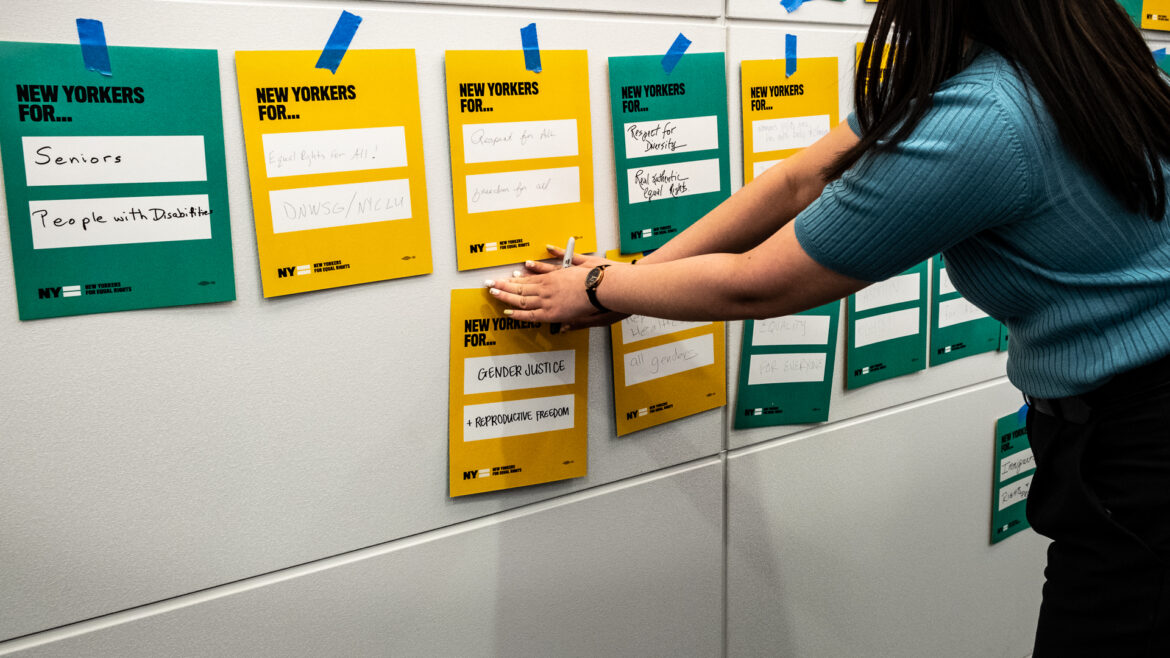
Adi Talwar
A kickoff event for the campaign to pass the New York Equal Rights Amendment on On March 21, 2024.“Really what we’re doing is shoring up our rights, ensuring that no matter where the wind blows, or how the wind blows, that here in New York, our rights are protected,” she said.
The clause has its detractors, including a group of wealthy conservatives who have recently donated millions of dollars into stopping Prop 1’s passage, with public ads falsely claiming he amendment would allow noncitizens to vote, according to the New York Times (it would not).
Republican State Sen. George Borrello, who represents New York’s 57th State Senate District in Western New York, called the amendment “unnecessary,” and said New Yorkers are already protected in the state constitution and the federal bill of rights.
He expressed reservations about the language of the amendment, which he believes would leave too much room for interpretation and could be used to limit free speech.
“It’s filled with Trojan horses,” he said. “The language is intentionally, I believe, very vague and that creates a lot of opportunity for dangerous situations.”
The amendment has strong backing from the Democratic party and advocacy groups including Planned Parenthood, the League of Women Voters, and the New York Civil Liberties Union. A recent Sienna College poll found that 69 percent of New York voters support the clause.
Eric Sanders, who leads the anti-LGBTQ discrimination firm Sanders Law P.C., called the amendment “just the first step.”
“The law itself doesn’t force the change. What forces the change are the people, thinking differently and having better understanding,” he said.
New Yorkers can find the yes or no question on the back side of their ballots when they vote early this week or in the national election on Tuesday, Nov. 5.
This story was produced as part of the 2024 Elections Reporting Mentorship, organized by the Center for Community Media and funded by the NYC Mayor’s Office of Media and Entertainment.
To reach the editor, contact Jeanmarie@citylimits.org.
*This story has been updated since original publication to correct the name of the NYLAG department where Betz works; it is the LGBTQ Law Unit, not Project.


